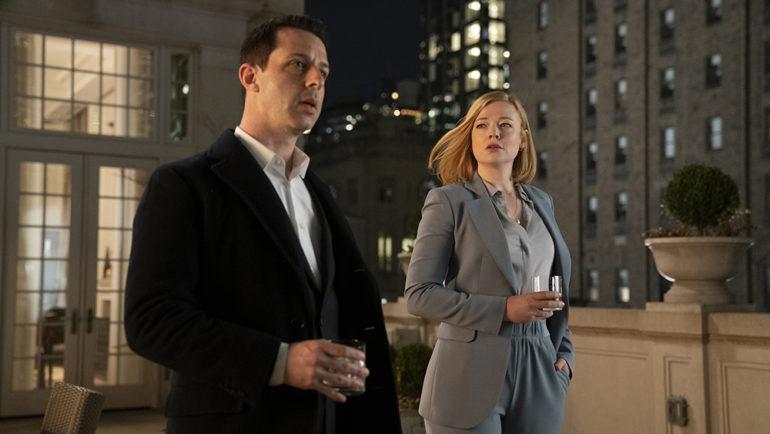TV Review: ‘Succession’ Season 2
By Daniel D’Addario
LOS ANGELES (Variety.com) – The first season of “Succession” felt, in ways good and bad, indebted to Sartre’s existentialist play “No Exit.” The characters — centrally, a trio of siblings scrapping for their corner of a family media empire, with various lackeys and hangers-on in their orbit — were miserable creatures, and unwilling to get out of one another’s way. The locations changed, but the condition of being stuck in a war that could not be won, and that could only be waged through vicious bickering, wore on.
What a pleasant surprise, then, that the second season has found a way forward — and has become vastly more interesting in the process. The world of the Roy family has opened up, yielding a meaningful understanding not merely of the lust for power but of what that power can do, and what privileges it strips away.
The arc of the first five episodes concerns the tending and maintenance of the family’s media holdings, with an internet-content company staffed by malcontents growing increasingly difficult to manage and a legacy outlet alluring as a potential acquisition. The enterprise provides variation and dimension for the characters, even as it represents but another front in the endless campaign the Roys have undertaken to dominate the world. Dutiful semi-reformed addict Kendall (Jeremy Strong), emerging from a bender that left a body count in its wake, hews to his father’s commands with both an appropriately chastened demeanor and too much zeal by half. Roman (Kieran Culkin) comes to seem yet more feckless and sniveling as, tasked with demonstrating something other than wit, he can no longer keep up in conversation. And Shiv (Sarah Snook), the shrewdest of her siblings and the show’s standout character, surprises herself at her willingness to play power politics with her family’s conservative media holdings, entities that run up against all of her core tenets except the most powerful of all: self-interest.
These character traits aren’t new, but they now exist in a relationship with patriarch Logan (Brian Cox), a compelling monster of entitlement whom the show has wisely brought back to exceedingly rude health after sidelining him for much of Season 1. His mercurial nature makes the show about something more than the literal struggle of but complicates that too; it’s more fun seeing people compete for the love of an active madman than a lion in winter. And the children gain shading and potency by being placed in situations that extend beyond the family: The Roys’ pathologies, as a group and as individual sufferers, are all the more striking when placed in context, and in contrast. We gain, for instance, a greater understanding of what it is that the Roy-owned cable news network, run by a sharply drawn neocon gorgon (the great Jeannie Berlin), does — and why its presence in the show’s ecosystem is quite so galling to Roy critics. We meet a muckraking journalist (Jessica Hecht) whose persistence indicates both how famous all the family’s members are and how much of their privacy and trust has been sloughed away in return for grand wealth. And a confab with a family whose establishment liberalism runs as deep as the Roys’ vapid self-worship provides something more interesting still: The Roys brought low, forced to confront that which they lack and cannot replace with money. Some of these absences are moral, like rectitude and the ability to get along; more crucially, though, is the lack of respect from those outside the family.
It’s through the new, wider aperture that we more clearly see the truth of the Roys: Led by a renegade outsider patriarch and populated by famously broken ne’er-do-wells, this is a family whose greatest export is schadenfreude. Hell, for them, really is other people — both one another and the general public, which more than amply volleys back the Roys’ contempt. The earlier iteration of “Succession” promised access to the gilded corridors of the Roys’ world and overdelivered: The poisonous bonbons of family hatreds grew a bit glutting with time. Showing us exactly what’s at stake in the fight for domination and how eroded the family trust is by public hatred, has made “Succession” into a fascinating document about what it’s like to live in a world one does not control. We the proletariat cannot understand what it’s like to have the power of the Roys, but they cannot understand our side of things either, and fumble in attempting to show a human touch. These collisions between the Roys and the rest of us have given “Succession” — richer in humor and insight even as it’s scabrous as ever — vibrant, dimensional life.
“Succession.” HBO. August 11. 10 episodes (five screened for review.)
Executive producers: Jesse Armstrong, Adam McKay, Frank Rich, Kevin Messick, Will Ferrell, Jane Tranter, Mark Mylod, Tony Roche.
Cast: Brian Cox, Jeremy Strong, Hiam Abbass, Sarah Snook, Kieran Culkin, Alan Ruck, Nicholas Braun, Matthew Macfadyen, Peter Friedman, Rob Yang, J. Smith Cameron, Dagmara Dominczyk, Arian Moayed

